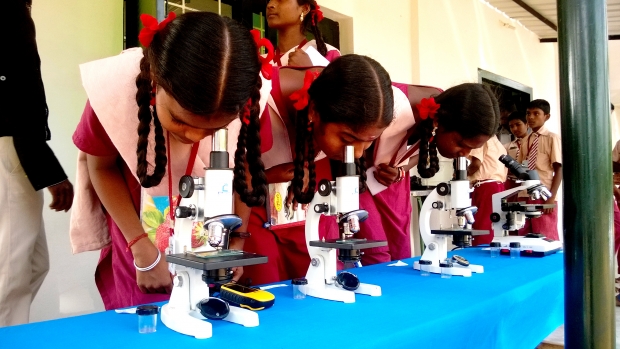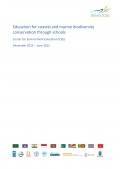Grants :: Small Grant Facilities :: Education for coastal and marine biodiversity conservation through schools
Education for coastal and marine biodiversity conservation through schools

Microscopic fun - learning about marine plankton, Palk Bay, Tamil Nadu © MFF India, 2013
Objectives
The objective of the project is to develop and education and awareness programme on coastal and marine biodiversity conservation, and to test it in nine schools in Gujarat, Goa, Kerala, Tamil Nadu and Pondicherry
Background
Threats to Indian coastal and marine ecosystems are intensifying with time; the effects of these will be felt in greater strength by future generations if we continue to exploit the environment unsustainably. Current school and college related education and awareness programmes on coastal and marine issues are inadequate, partly due to the lacking quality and quantity of available information. This project will develop and assess a marine education related curriculum in nine coastal schools in Gujarat, Goa, Kerala, Tamil Nadu and Pondicherry. Schools will be engaged in field based learning (to identify and address threats to coastal and marine ecosystems and biodiversity) with guidance from CEE, as well as participation from the local community and key stakeholders. The project contributes to Aichi Target 1 (UN CBD) which states that “by 2020, at the latest, people are aware of the values of biodiversity and the steps they can take to conserve and use it sustainably”.
Target beneficiaries
Students and teachers of project schools
Local communities with whom school project activities are conducted
Outputs
- Curriculum and resource materials for teaching coastal conservation education in schools from coastal states
- Capacity building, and associated training for teachers/mentors to teach coastal conservation related curriculum
Accomplishments and challenges
Some of the major impacts/achievements were:
- Designing a marine education curriculum framework which is offered as a “Place Based, Project Based”, IT enabled action research programme for facilitating marine conservation, global citizenship and sustainability education through schools. Any school in India (preferably English medium) from the coastal areas can sign up for this programme and implement the marine education project through a 7-step learning journey which can be customized based on their location, student age group and formal curriculum linkage.
- Creating an innovative web-based platform (http://ceegcs.org/GCS/client/index.php) for offering the marine education project as a national and international programme to connect schools from coastal areas across the nation and world. The web format enables participating schools to share their project learnings, post e-learning resource materials (visual, audio, video) in any language, network with other schools (including International schools) and mentors, experts online.
- Benefiting the local communities in the school’s project study site by highlighting their sustainability issues through the school students and engaging school students to take positive actions/citizen action in such areas – e.g. like beach clean up, waste management activities.
- Creating partnerships with the State Government departments, other organizations to support the marine education programme through their existing formal networks – e.g. through the National Green Corps (NGC) Coordinators in Tamil Nadu and through the State Council for Education Research and Training (SCERT) in Goa. The project can therefore sustain with selected schools in Gujarat, Tamil Nadu, Goa and opportunity to initiate/scale up in other states.
- Getting cooperation from the school management to continue the project in the subsequent academic years and building flexibility in the programme for schools to decide the standards and number of students / teachers to involve in different stages of their project
Some challenges were:
- One school dropped out language issues (since the programme offered in mostly in English language) and in a couple of cases the trained teacher leaving the school due to which the individual school project progress was affected. The development of the website was hindered due to some technical issues (now sorted out) due to which the online interactions and project sharing between students/teachers could not be held on a more frequent basis than desired.
- The academic calendar of schools sometimes does not permit all students to undertake field visits to their project sites on a frequent basis. These are subject to permissions by school management and motivation of the individual school teacher. Other school co-curricular activities and administrative/teaching responsibilities of the teacher sometimes does not allow the teacher to spend more time for the project facilitation.
- In some cases, the project site (coast) nearest to the school is not as such safe for students to visit and hence safety issues may restrain the school management to permit field visits unless accompanied by the institutional facilitators (CEE Staff).
Contributions to cross-cutting themes
The project methodology encourages students to identify sustainability issues in their coastal stretches, including community concerns. Through teacher facilitation and student discussions on such issues they can relate the climate change angle/perception to understand the underlying cause-effect relation of such issues. Students formulate their local actions like tree plantations; beach cleaning etc. which also contribute to positive actions for climate change adaptation/mitigation
Lessons Learned
- Teachers must be encouraged to integrate the external project into their formal academic year planning which helps them to block / reserve time for its implementation. The school management must be supportive enough to encourage such integration.
- iAccess to internet may be a constraint for some schools and some support like (internet dongle; tablets) may encourage schools to be more proactive in use of IT and sharing of project progress/learnings on a regular basis.
- The teacher training/ student training can also be done in a “Camping” mode – thereby encouraging them to learn about the modalities of the project as well as ecological aspects of marine ecosystem on a practical basis. This could be like a 3 day camp in selected coastal sites like mangrove areas/estuarine area. This may also be on a part-payment basis. This could then be followed up with schools choosing individual coastal stretches nearest to their school to formulate their project objectives and interventions.
- The project can also be offered as a ‘marine education course for teachers’ which has modules on developing their skills for developing lesson plans using their formal school curriculum framework and the marine education project structure/methodology which has been developed and being currently offered in this project.
- The development of mobile apps for field survey and collation of observations may be useful to engage more stakeholders to contribute to the school project and overcome issues with access to computer/ website. Gaming as an approach for disseminating minimum learnings about marine environment, sustainability issues may also be explored as a important learning approach/tool. However, the use of mobiles in schools is restricted and depends on school management views.
- Opportunities for the involvement and role of parents/family in the school project may be explored / strengthened in the project design so as to encourage better impacts of marine conservation education at individual, family, neighbourhood and community level.
- The vacation period of the schools may be tapped in innovative ways so that the project has continuity outside the formal school academic year timeline.
Project Facts
Country
Location
Schools in Gujarat (Gulf of Kutch, Diu, Daman, Bharuch); North Goa; Kerala (Kannur); Pondicherry; Tamil Nadu
Topic
- Capacity development
- Civil Society Engagement
- Community Resilence
- Knowledge management and communications
Duration
10th Dec 2013 to 15th Jun 2015
MFF Grant Amount
INR 1,159,500
Co-financing Partner
Center for Environment Eduation (CEE): INR 224,000
Co-financing from other CEE Project 1600): INR 105,000
Participating schools: INR 99,000 (in total)
Implementing Partner
Dr. Shriji Kurup
Programme Coordinator, Center for Environment Education
Email: shriji.kurup@ceeindia.org
Related Publications

Education for coastal and marine biodiversity conservation through schools
Author: CEE and IUCN
Publisher: IUCN
Posted on: 12th May 2016
Category: SGF (Small Grant Facility)
Size: 953 KB